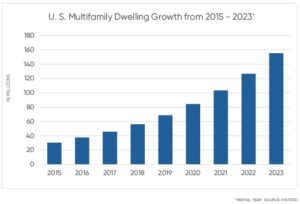New Florida Law Requires Major Changes for Multifamily Commercial Building Owners
 Florida has long been named to the American Tort Reform Foundation (ATRF) Judicial Hellholes list, ranking No. 1 in 2018 and No. 2 in 2019. Though having made significant improvements since 2020, it remained on the watch list until 2023, when it was officially removed from the report. Even further, Florida was named a “Point of Light” in the 2023-2024 Judicial Hellholes report.
Florida has long been named to the American Tort Reform Foundation (ATRF) Judicial Hellholes list, ranking No. 1 in 2018 and No. 2 in 2019. Though having made significant improvements since 2020, it remained on the watch list until 2023, when it was officially removed from the report. Even further, Florida was named a “Point of Light” in the 2023-2024 Judicial Hellholes report.
“The 2023 legislative session brought a great sea change for the state’s civil justice system. Florida lawmakers passed legal reform bills that have the potential to rebalance the state’s legal system for many years to come,” according to the report.
A significant contribution to this change was House Bill (HB) 837, sponsored by Representatives Tommy Gregory and Tom Fabricio and Senator Travis Hutson. In March 2023, Gov. Ron DeSantis signed HB 837 into law, and it took immediate effect. A broad tort reform revision, it includes changes to liability law for multifamily housing and apartment owners.
A multifamily residential property is defined to encompass apartments, duplexes, townhouses, and condominiums of at least five dwelling units on a given parcel of land. Aimed at protecting property owners from paying excessive damages in frivolous lawsuits, the bill has many advantages. It is important for multifamily residential property owners to have a strong understanding of how the new law affects them and how they need to respond.
What is HB 837?
HB 837 contains three main deliverables, according to the office of Gov. DeSantis. It “modifies the bad faith framework, eliminates one-way attorney’s fees and fee multipliers, and ensures that Floridians can’t be held liable for damages if the person suing is more at fault.”
To start, HB 837 eliminates one-way attorneys fees and reins in the use of contingency risk multipliers. “Multipliers have been used to drastically increase attorney’s hourly fee awards even in run-of-the-mill cases, spurred largely by the Florida Supreme Court’s concerning decision Joyce v. Federated National Insurance Company,” according to the Florida Justice Reform Institute. Under HB 837, the lodestar standard fee prevails and litigants may still overcome that presumption under exceptional or rare circumstances to ensure access to necessary counsel.
The bill also reduces the statute of limitations for general negligence cases from four years to two years and provides uniform standards for juries in calculating medical damages.
“Under the prior system, some lawyers and allied medical clinics would inflate the damage award, hide the true value of medical expenses from the court through misuse of ‘letters of protection,’ and collect larger fees. H.B. 837 ensures jurors receive accurate information on the actual value of medical expenses,” said the ATRF.
Additionally, one of the most noteworthy parts of the bill is that it prevents Florida apartment and multifamily housing owners from being held liable for damages if the person bringing the lawsuit is more at fault than the defendant. The modified comparative negligence system means that any party who is found to be more than 50% at fault for his or her own harm is barred from compensation recovery.
For example, if a tenant of a multifamily property invites a guest to his or her home to engage in a criminal activity and either the tenant or the guest is injured, neither the tenant nor the guest can successfully recover a judgment from the landlord if the party seeking recovery (either the tenant or the guest) is determined to be more than 50% at fault for the injuries.
HB 837 Requirements
HB 837 intends to reduce risk exposure related to negligent security claims for property owners who fulfill three requirements prior to a claimed negligence incident. The requirements include:
- Having records of physical safety measures taken at the property.
- Conducting a crime prevention audit.
- Providing crime prevention training for all employees.
The deadline for the audit and employee crime-prevention training is Jan. 1, 2025. Fulfillment of the requirements should be based on Crime Prevention Through Environmental Design (CPTED) principles, and a CPTED assessment is needed.
It is recommended that property owners conduct an internal preliminary safety analysis before their formal audit. Based on that internal examination, property owners can take appropriate measures to comply with CPTED principles in preparation for the full audit.
Next Steps
Property owners should meet with their property managers to discuss HB 837 and start implementing safety measures.
Our team at Insurance Office of America is here to provide clients with risk management and insurance solutions to help respond properly to new and existing market conditions, including HB 837, to better protect their business. Please contact your agent for more information.

